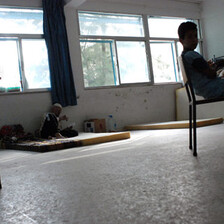Baddawi Refugee Camp 11 September 2007
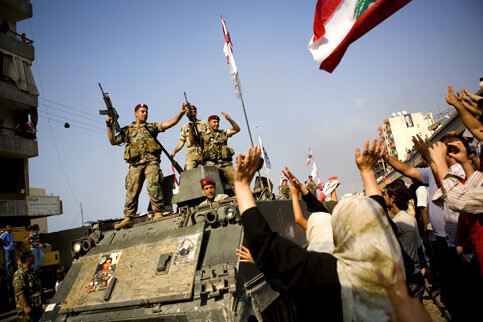
As the Lebanese army celebrates their victory over Fatah al-Islam militants …

… the homes of Palestinians in the Nahr al-Bared refugee camp lie in ruins, 4 September 2007.
4 September 2007
It took over three months, but in the end the Lebanese army claimed victory over Fatah al-Islam, the previously unheard of non-Palestinian, al-Qaida-inspired group that had established itself in the Nahr al-Bared Palestinian refugee camp in northern Lebanon. On Tuesday, 4 September 2007, outside the entrance to the destroyed camp the Lebanese army massed together to begin what would be a 10-hour-long parade from Nahr al-Bared to Beirut just over 50 miles away.
Meanwhile, Palestinian refugees displaced from Nahr al-Bared staying in the nearby Baddawi refugee camp watched the parade live on television. Many cursed the images they saw of the Lebanese army celebrating their achievement. A young medical volunteer entered the room and as he watched the TV said, “You know, two Palestinians from Nahr al-Bared were taken yesterday by the army and beaten when they were near Nahr al-Bared. They’re in the hospital now.” It was said that they were arrested when they went back to survey the damage done to the camp. The details were unclear but some of the Palestinians in the camp were preparing to visit the hospital to check in on the two.
As they explained this a couple of Lebanese army helicopters flew close overhead. A group of children displaced from Nahr al-Bared staying in a UN school in the camp congregated and clapped, excited by the loud chopping noise.
7 September 2007
“Where is Abu Yasser?” One of the men who runs one of the social centers in the camp summoned a younger boy to go and find Abu Yasser. It was Friday afternoon and Baddawi camp was calm. People were resting in their homes or out buying last-minute groceries in preparation for dinner. Kids, as always, roamed the streets, chanting, clapping and playing their usual games.
“Yalla, go see where Abu Yasser is and tell him to come here.”
As the boy left he stopped as another young man turned the corner and walked towards us. He wore a light jumpsuit and dragged his feet as he walked with a bashful smile on his face. “Abu Yasser, come show these people what they did to you.”
He came over and quickly shook hands with everyone before sitting down to unzip his jacket to show us the wounds on his back. Lashes zigzagged across his back, like those inflicted upon black slaves by white American slaveowners.
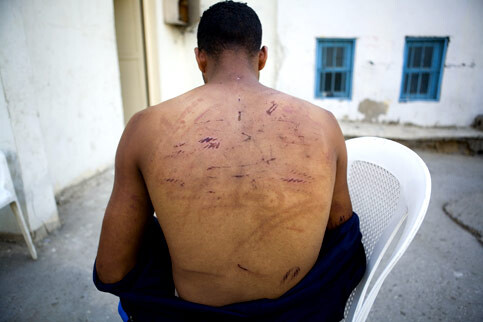
Abu Yasser showing where he was beaten and whipped with metal chains by the Lebanese army.
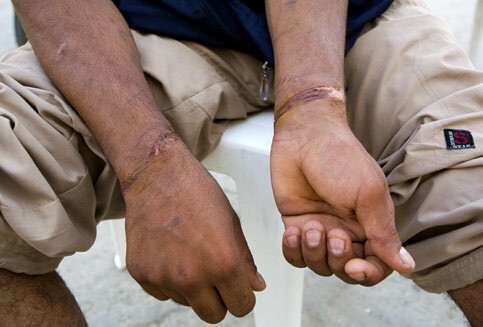
Abu Yasser showing the scars on his wrists where the army attached metal bracelets and electrocuted him.
Like most from Nahr al-Bared, Abu Yasser left the camp soon after the fighting escalated between the Lebanese army and Fatah al-Islam. Since then he had been staying in Baddawi camp. Two months ago he found work close to Nahr al-Bared painting homes and other buildings; it’s common work for Palestinians in Lebanon since it’s one of the few trades not forbidden to them under Lebanese law.
Each day he traveled from Baddawi by taxi to his work, passing through many checkpoints without problems from the army. The road took him right next to the fighting, where he could look out of the taxi’s window to see the destruction of the camp that grew more severe each day.
The fighting was said to be over on Sunday, 2 September 2007. The following day violence reignited briefly when some surviving Fatah al-Islam militants in Nahr al-Bared attacked the army. It was on this day that Abu Yasser was stopped on his way to work.
At 9:30am Abu Yasser was traveling in a taxi with a Lebanese driver close to Nahr al-Bared. The army had been patrolling the area in search of militants who had escaped from the camp as the fighting wound down. The taxi was stopped and the soldiers asked for Abu Yasser’s ID. He showed his Palestinian identification papers and the army handcuffed and blindfolded him without explanation. He would spend the next 12-and-a-half hours under Lebanese army custody.
“They beat me with my hands, feet and neck tied together so I couldn’t move. They used chains to whip my back, and they hooked up electricity to my wrists and electrocuted me … they also did things to my sensitive areas.” They asked Abu Yasser about Fatah al-Islam but they knew that he and most Palestinians had no relationship to the group.
“They wanted me to cry, and because I didn’t cry they kept beating me.” As he lay on the floor of the interrogation center, bleeding and his limbs tied tightly together, Abu Yasser’s torturers told him, “ ‘Let this be a message to the other Palestinians.’”
Since the conflict began tensions have arisen between Palestinians in the camps and the Lebanese army and civilian population. There have been many reports of abuse at checkpoints; Palestinian and international activists documenting the human rights abuses by the Lebanese army estimate that around 130-160 Palestinians arrested during the conflict remain in Lebanese prisons. Many were beaten and two were killed at a June demonstration during which Nahr al-Bared residents were attempting to return to the camp were beaten and shot at by Lebanese civilians and the army.
Abu Yasser was released at midnight. He took a taxi back to Baddawi where he was immediately taken to a camp hospital where he would stay for the next two days.
As he told his story a crowd had gathered to listen. Someone commented how the Lebanese army was treating the Palestinians just like the Israelis. When asked if there was anyone who had lived through the 1948 Nakba — when Zionist forces expelled Palestinians from their homeland — as well as the latest crisis in Nahr al-Bared, everyone turned to an old man engaged in conversation with another and told him to come over.
The old man came over and joined in the circle of white plastic chairs. Mousa al-Ali, or Hajj Mousa, was 10-years-old in 1948 and remembered clearly how his family left their homes in a village near Safad in what was then northern Palestine.
“We left Palestine in 1948 with nothing the same way we left Nahr al-Bared. But the Nakba was easier when we left Palestine. Then, we knew who our enemy was. Now, we don’t know who is our enemy and who is our friend.”
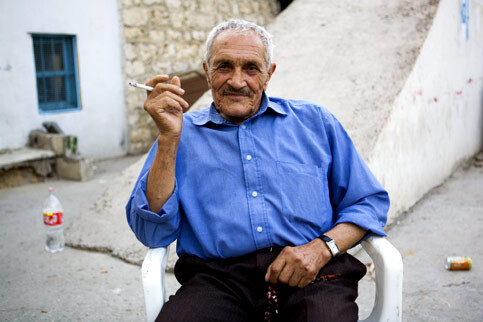
Hajj Mousa
Hajj Mousa said he couldn’t recall his age exactly. Judging from about how old he was in 1948 we figured he was 69. Someone shouted to him, “Hajj, are you 69?”
“Sure, that sounds about right,” he smiled with his arms folded across his stomach, looking around to the rest of the circle.
As we sat a group of young girls walked by in the street and shouted, “Abu Yasser! Abu Yasser!”
Abu Yasser’s face turned a shade of red as he waved back. I watched the girls giggle and run away and turned to Abu Yasser and asked, “Abu Yasser, how old are you?”
“Eighteen,” he replied quietly with that same shy smile. Despite all he had been through in the previous days, it was as if he still knew that he was young and his story was but a small part of the greater Palestinian struggle that has gone on for decades.
…
Next year marks the 60th anniversary of the year 750,000 Palestinians were forced from their historic lands and ended up in places like the Nahr al-Bared refugee camp. Still unable to return to their homeland, the refugees from Nahr al-Bared are probably the only people in the world demanding the right to return to a refugee camp.
The discussion surrounding the Israeli-Palestinian conflict is narrowly focused on the issue of the occupation in the West Bank and Gaza. The rights of Palestinian refugees have almost entirely dropped off the radar. It’s clear that Israel, unwilling to even give up its illegal settlements built on Palestinian land in the West Bank, will certainly not acknowledge or grant the Palestinians’ right to return despite numerous UN resolutions reaffirming this right.
The destruction of the Nahr al-Bared Palestinian refugee camp is reminder that it is time to refocus the discourse and include the Palestinian refugees of 1948 and 1967, when as many as 250,000 Palestinians were displaced, many for a second time. Their human dignity not respected, Palestinian refugees are and have been vulnerable to treatment like that which Abu Yasser suffered while detained by the Lebanese army. They enjoy no rights, have no representative government, no passport, no home in which they can comfortably live. They have only one right to which they cling — the right to return to Palestine.
As Hajj Mousa explained, “If we could return to Palestine, all of us [in Lebanon] would leave everything we have here and return with nothing just as we came here in 1948.”
All images by Matthew Cassel.
Matthew Cassel is an independent journalist and photographer based in the Middle East.
Related Links



